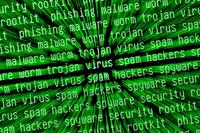-
Iran: Stuxnet infected industrial computers cleaned
Iran claims that Stuxnet, the sophisticated virus which has infected more than 30,000 computers used in industrial control systems in Iran, has been removed; Iranian officials also denied that the Bushehr nuclear reactor was among the addresses penetrated by the worm
-
-
Impact of cyberattack on U.S. could be "an order of magnitude surpassing" 9/11
Former director of national intelligence and director of the National Security Agency Mike McConnell and Bush administration Homeland Security Adviser Fran Townsend say the United States is unprepared for a cyberattack and must overhaul its defenses; they said a large-scale cyberattack against the United States could impact the global economy “an order of magnitude surpassing” the attacks of 9/11; McConnell: “The warnings are over; it could happen tomorrow”
-
-
U.S. Cyber Command will not go operational today as planned
The U.S. Cyber Command was to become operational today — but difficulties in recruiting qualified uniformed staff and lack of clarity about the Command’s mission have led the Command leaders to say that rather than fully operational, the Command, for the time being, will remain only at “initial operational capability”
-
-
Sector Report for Thursday, 30 September 2010: Cybersecurity
This report contains the following stories.
Plus 2 additional stories
-
-
Stuxnet shows how nuclear plants may be attacked
Security experts say that critical infrastructure firms need to respond quickly in order to protect their systems from Stuxnet, and warn that its spread may mark the beginning of increased cyber espionage and sabotage; what is especially worrisome about Stuxnet is that a pattern in its code — designed to match that of a specific application — suggests that the worm’s authors had a specific facility in mind
-
-
October's National Cyber Security Awareness Month launched
Dozens of cybersecurity initiatives to reach consumers, students, and businesses; the National Cyber Security Alliance (NCSA), DHS, and the Multi-State Information Sharing and Analysis Center, have sponsored National Cyber Security Awareness Month every October since its founding in 2003
-
-
Faster cybersecurity with merging of two protocols
Combination of unrelated protocols — a suite of automated network access control standards from the Trusted Computing Group and the government’s Security Content Automation Protocols (SCAP) — now being tested in South Carolina to enable automated policy enforcement on networks; the two standards offer a complementary set of capabilities, each valuable in its own right but much more powerful when combined
-
-
Ethical hacking conference coming to Charleston, WVA
A major ethical hacking event will take place in Charleston, West Virginia, 23-24 October; the event will focus on “white hat hacking” — meaning learning how to think like the “black hat hackers” or bad actors and how they operate; a Hacker Village will be set up at the Charleston Civic Center featuring a network of systems designed with vulnerabilities so attendees can try their stuff with mentors on hand
-
-
Cyber innovation center launches in Maryland
SAIC opens a new Cyber Innovation Center in Columbia, Maryland; SAIC employees in Columbia and throughout the United States will have remote access to the Center’s technical-solutions lab
-
-
U.S. battling simulated cyber attack in Cyber Storm III exercise

A 3-day cyber exercise simulates a “large-scale cyberattack on critical infrastructure,” involving thousands of participants at computer work stations across the globe and is one of the largest such exercises ever conducted; the biennial exercise is being staged by DHS and is the first test of the new National Cybersecurity and Communications Integration Center (NCCIC); the NCCIC booted up in October 2009 to serve as the coordinating center for U.S. cybersecurity operations and houses U.S. government computer experts and their private sector counterparts under one roof
-
-
U.S. to make Internet wiretaps easier

The Obama administration plans to submit a bill next year that would require all online services that enable communications to be technically equipped to comply with a wiretap order; this would include providers of encrypted e-mail, such as BlackBerry, networking sites like Facebook, and direct communication services like Skype; federal law enforcement and national security officials say new the regulations are needed because terrorists and criminals are increasingly giving up their phones to communicate online
-
-
Iran admits its nuclear facilities are under massive cyberattack

Iran has confirmed that 30,000 computers in the country’s power stations, including the nuclear reactor in Bushehr, have been attacked by the Stuxnet worm; the Stuxnet worm is described by experts as the most complex piece of malware ever designed; once Stuxnet gains access to a plant’s computers, it hunts out specific software that controls operations such as the opening and closing of valves or temperature regulation; by halting those processes it can cause extensive damage to nuclear power stations, power grids or other industrial facilities; the high number of infections in Iran have led experts to conclude that the worm may have been designed in the United States or Israel to disable Iran’s controversial nuclear facilities
-
-
Secure network for critical infrastructure idea draws fire
The Obama administration wants to develop a secure computer network to defend civilian government agencies and critical civilian infrastructure and industries; the restricted network would allow the government to provide greater protection to vital online operations and critical infrastructure — such as financial networks, commercial aviation systems, and the national power grid — from Internet-based attacks; critics say this ambitious idea is impractical
-
-
Experts: Israel used cyber weapon to disrupt Iran's nuclear reactor

The Stuxnet malware has infiltrated industrial computer systems worldwide in July and August; now, cyber security experts say that the worm was, in fact, is a search-and-destroy cyber weapon meant to hit a single target — Iran’s Bushehr reactor; Stuxnet amazed — and stunned — computer security experts: too large, too encrypted, too complex to be immediately understood, it employed amazing new tricks, like taking control of a computer system without the user taking any action or clicking any button other than inserting an infected memory stick; in Stuxnet, the world faces a new breed of malware that could become a template for attackers wishing to launch digital strikes at physical targets worldwide — Internet link not required
-
-
Students think hacking is "cool"
A third of students surveyed thought that hacking was “cool,” and a similar number thought it was “easy”; the survey found that 37 percent had hacked Facebook accounts, 26 percent e-mail accounts, with 10 percent breaching online shopping accounts; an entrepreneurial 15 percent revealed that they hacked to make money
-
More headlines
The long view
Researchers Develop AI Agent That Solves Cybersecurity Challenges Autonomously
New framework called EnIGMA demonstrates improved performance in automated vulnerability detection using interactive tools.
